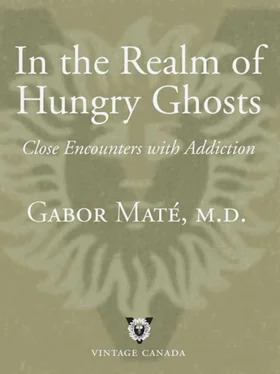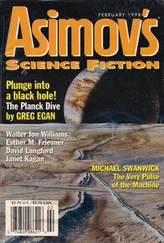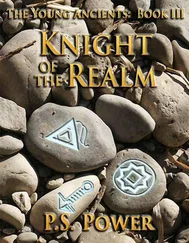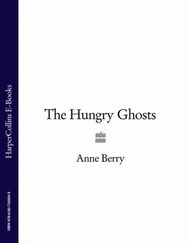
In a photo we have at the Portland, Sharon, in a black bathing suit, sits on a sun-dappled deck, her legs immersed in the shimmering, clear water of a blue-tiled pool. Relaxed and composed, she smiles directly at the photographer’s lens. This is the young woman of joy and possibility memorialized by the priest, captured here by the camera a few months before her death, revelling in the warmth of a late fall afternoon at the home of her Twelve-Step sponsor.
In the twelve years Sharon spent in the Downtown Eastside, she could not complete those twelve steps. She’d been so dysfunctional and cocaine aggressive that until the day she was accepted as a resident at the Portland, she’d been barred from even visiting the hotel. “That’s how it works,” Portland Society director Kerstin Stuerzbecher told me in the foyer of the chapel after Sharon’s funeral. “There are only two choices: either you’re too much trouble to be allowed to live here or you’re so much trouble you can live only here.
“And die only here,” Kerstin added as we stepped out into the sunlight.
CHAPTER 3

The Keys of Paradise: Addiction as a Flight from Distress

Dismissing addictions as “bad habits” or “self-destructive behaviour” comfortably hides their functionality in the life of the addict. 1
VINCENT FELITTI, M.D., PHYSICIAN AND RESEARCHER
It is impossible to understand addiction without asking what relief the addict finds, or hopes to find, in the drug or the addictive behaviour.
The early-nineteenth-century literary figure Thomas De Quincey was an opium user. “The subtle powers lodged in this mighty drug,” he rhapsodized, “tranquilize all irritations of the nervous system…sustain through twenty-four hours the else drooping animal energies…O just, subtle and all-conquering opium…Thou only givest these gifts to man; and thou hast the keys of Paradise.” De Quincey’s words encapsulate the blessings of all drugs as the addict experiences them—indeed, as we shall see later, the appeal of all addictive obsessions, with or without drugs.
Far more than a quest for pleasure, chronic substance use is the addict’s attempt to escape distress. From a medical point of view, addicts are self-medicating conditions like depression, anxiety, post-traumatic stress or even ADHD (attention deficit hyperactivity disorder).
Addictions always originate in pain, whether felt openly or hidden in the unconscious. They are emotional anaesthetics. Heroin and cocaine, both powerful physical painkillers, also ease psychological discomfort. Infant animals separated from their mothers can be soothed readily by low doses of narcotics, just as if it was actual physical pain they were enduring. *3 2
The pain pathways in humans are no different. The very same brain centres that interpret and “feel” physical pain also become activated during the experience of emotional rejection: on brain scans they “light up” in response to social ostracism just as they would when triggered by physically harmful stimuli. 3When people speak of feeling “hurt” or of having emotional “pain,” they are not being abstract or poetic but scientifically quite precise.
The hard-drug addict’s life has been marked by a surfeit of pain. No wonder she desperately craves relief. “In moments I go from complete misery and vulnerability to total invulnerability,” says Judy, a thirty-six-year-old heroin and cocaine addict who is now trying to kick her two-decade habit. “I have a lot of issues. A lot of the reason why I use is to get rid of those thoughts and emotions and cover them up.”
The question is never “Why the addiction?” but “Why the pain?”
The research literature is unequivocal: most hard-core substance abusers come from abusive homes. 4The majority of my Skid Row patients suffered severe neglect and maltreatment early in life. Almost all the addicted women inhabiting the Downtown Eastside were sexually assaulted in childhood, as were many of the men. The autobiographical accounts and case files of Portland residents tell stories of pain upon pain: rape, beatings, humiliation, rejection, abandonment, relentless character assassination. As children they were obliged to witness the violent relationships, self-harming life patterns or suicidal addictions of their parents—and often had to take care of them. Or they had to look after younger siblings and defend them from being abused even as they themselves endured the daily violation of their own bodies and souls. One man grew up in a hotel room where his prostitute mother hosted a nightly procession of men as her child slept, or tried to, on his cot on the floor.
Carl, a thirty-six-year-old Native man, was banished from one foster home after another, had dishwashing liquid poured down his throat at age five for using foul language and was tied to a chair in a dark room in attempts to control his hyperactivity. When he’s angry at himself—as he was one day for having used cocaine—he gouges his foot with a knife as punishment. He confessed his “sin” to me with the look of a terrorized urchin who’d just smashed some family heirloom and dreaded the harshest retribution.
Another man described the way his mother used a mechanical babysitter when he was three years old. “She went to the bar to drink and pick up men. Her idea of keeping me safe and from getting into trouble was to stick me in the dryer. She put a heavy box on top so I couldn’t get out.” The air vent ensured that the little boy wouldn’t suffocate.
My prose is unequal to the task of depicting such nearly inconceivable trauma. “Our difficulty or inability to perceive the experience of others…is all the more pronounced the more distant these experiences are from ours in time, space, or quality,” wrote the Auschwitz survivor Primo Levi. 5We can be moved by the tragedy of mass starvation on a far continent; after all, we have all known physical hunger, if only temporarily. But it takes a greater effort of emotional imagination to empathize with the addict. We readily feel for a suffering child, but cannot see the child in the adult who, his soul fragmented and isolated, hustles for survival a few blocks away from where we shop or work.
Levi quotes Jean Améry, a Jewish-Austrian philosopher and resistance fighter who fell into the grasp of the Gestapo. “Anyone who was tortured remains tortured…Anyone who has suffered torture never again will be able to be at ease in the world…Faith in humanity, already cracked by the first slap in the face, then demolished by torture, is never acquired again.” 6Améry was a full-grown adult when he was traumatized, an accomplished intellectual captured by the foe in the course of a war of liberation. We may then imagine the shock, loss of faith and unfathomable despair of the child who is traumatized not by hated enemies but by loved ones.
Not all addictions are rooted in abuse or trauma, but I do believe they can all be traced to painful experience. A hurt is at the centre of all addictive behaviours. It is present in the gambler, the Internet addict, the compulsive shopper and the workaholic. The wound may not be as deep and the ache not as excruciating, and it may even be entirely hidden—but it’s there. As we’ll see, the effects of early stress or adverse experiences directly shape both the psychology and the neurobiology of addiction in the brain.

Читать дальше














